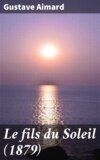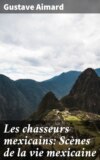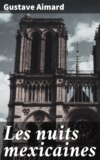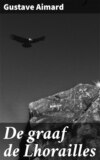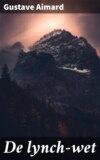Kitabı oku: «The Red River Half-Breed: A Tale of the Wild North-West», sayfa 10
CHAPTER XX
THE UNDERMINER
As it came on nine o'clock, Lieutenant Joe and Dearborn took leave of their superior and of the table.
The former of the pair seemed to be overpowered by sleepiness, for he had been blinking like an owl during the conversation, and, were he not so polite a man, would have fallen forward and slumbered among the dishes, his head on his arms.
The guide had altered his purpose; on second thoughts, he preferred to make the circuit outside the camping ground for the better security of all. So he bade the captain good night after announcing his changed resolve, and promising to be back a bit before sun-peep.
Joe shook himself up, still polite, and volunteered to take the guide round and show him where the lookouts lay, in order he might not get shot by them at the dawn. During this short jaunt the two spoke very little, and what they said were commonplaces. They knew quite well that they were under the eyes of the leader, who came out to the tent mouth ostensibly to finish his cigar.
After bidding one another good night bluffly, hunter and gold seeker parted. The Englishman leaped over the barricade and glided into the shadows. As Joe retraced his steps, he saw the captain disappearing in the tent, where the loose flap fell and hid him.
The second officer had a green bough shelter run up for him against a rock. Thither he proceeded and insinuated himself within; but, despite the cold, he left the wagon tailboard, which might flatteringly be styled the door, on one side. He would not have a fire, and showed no light. He pulled out a horsehair covered trunk, sat on it, folded his arms, and appeared to await being frozen stiff.
Not only, though, had all semblance of drowsiness quitted his features, but, judging by his eyes, he was as wide awake as ever; these were directed on the captain's tent. Its opening and that of his shed faced, so that he could spy into it, protected himself by the complete darkness in which he was lodged.
Kidd kept a lamp burning for quite half an hour. Joe tried his best to see what he was doing, but that was not possible. Nevertheless, he persevered in studying the tent which contained so many mysteries for him. At length, the attraction of curiosity was so strong as to become irresistible. He left his seat, and, stealing forth, scanned the scene without.
Deep stillness reigned over the darkened camp, for a fine, cold rain had lowered the fires. Rolled up in their blankets, the gold grabbers had packed into shelter and slumbered soundly. The watchers themselves, with only their noses and eyes exposed, were shrunk up into the best covering the bushes and palisades afforded against the wet.
But the light still glittered in the captain's tent.
The Carcajieu would hold back no more.
And yet he knew that when the chief retired for the night, he blocked himself in so that it was impossible to get at him without his leave or knowledge. As for peering and prying, no one had tried what would lead to discovery. Besides, what could the curious make of it; the tent was double; there was full three inches space between the outer jacket and inner canvas, a precaution taken along with others for serious reasons, to the end that, when the captain did shut himself up, he could be delivered of daily constraint and be himself unfettered.
Such were the more or less plausible suppositions to which Corky Joe had arrived since he formed part of the expedition. He had often sought without success to discover this puzzling mystery. But his repeated failures, far from calming his curiosity, by proving the uselessness of his abortive attempts, so pricked him on, that he determined at any cost to tear the heart out of the enigma. The present occasion struck him as so favourable, that he made up his mind to try again, whatever the consequences, if he ran into a trap.
Sharp as was Kidd, Joe reckoned himself to be on a par with him. At least, he rarely acted without forethought, sound, though not long, perhaps. He was patient, preparing in advance the means for carrying out his plans. He had never yet been taken in an unguarded moment. Whenever he had failed, he set down the loss to chance, fate, or whatever name it goes by.
Since too long a time had the faithless lieutenant been planning out to learn what went on in the captain's snuggery when he was closeted in for him not to have a better result, because he profited by previous mischances.
Matters stood as follows this time —
Every time the train started the lieutenant took the advance with a dozen picked men. Not only did they scout and roughly clear a road, but they pushed on to the night camping ground. There they chopped bushes and trees, built fires, or even lit them to warm the ground and drive away vermin, as all small game is called, and put up the tents for Doña Rosario, the women, and the leader. These they carried on led mules, the cloth wrapped round their tools and eatables, so that part of the load was exhausted on the way and at the end of the journey. When the main body came up, it moved into position already traced, and completed the entrenchment with the wagons and loads. A few shanties were knocked together, and that was all. If the pickets had much of a start, they did so much work whilst waiting, that the rest often did not have to delay half an hour before meals.
The first act of the chief was to see if his tent was pitched to suit. If not, he would have the site shifted, and overlook this being done in person; this was of rare occurrence, but it had happened. Though, in the beginning, his men had been curious about the tent, two months' fatigue had blunted the feeling. Besides, what interest had tired men, wet and muddy with fording, in puzzling out matters of no value to them? – To say nothing of Kidd, notably "sudden with his pistol," being always on the lookout. Besides, as he had often reflected, he was sure enough of the relatively devoted nature of the principals of his band. If he had to do with mere inquisitiveness his reasoning would have been correct. Even Paul Pry will get fagged out in the end, but it was not such a paltry nature that was pitted against him.
The Carcajieu had potent grounds for persevering in unearthing his secret. Therefore, he would never stop till that secret lay under his feet, or he was stretched dead upon it.
The captain was ignorant of this, and could not even dream of it. He never once thought of doubting Joe, and conjecturing that he was undermining him like a mole. Surrounding circumstances also forced him to bestow on his second as much trust as lay in so wary a character.
On pushing ahead to the camping place, Joe had set his pioneers to use their axes upon the brushwood, whilst he examined the land.
The position was intelligently selected by Dearborn, healthy and easy to defend. It was an opening "park," in the midst of a thick wood climbing the abrupt foothills of the Rockies. On the right, an uncracked block of stone rose up sheer to an incalculable height, and forefended any attack from that quarter.
Like the broken arch of a natural stone bridge, a huge rock, hollowed out by water in ancient days, covered about a third of the clearing, to the height of a score yards. On the left the mountain sides, well wooded, gently sloped down.
The Carcajieu scanned the rocks alluded to. Hurled from the mountain crest in some horrible cataclysm, they had crashed together chaotically, and cheating moss and shrubs seemed to have knit them into a solid mass. In reality, though nothing but a wonder of balancing kept them in their arrangement. There was another discovery made by the lieutenant, that almost forced him to whoop for joy, and did force the whistling of a lively dance tune in an undertone.
When the bush work was formed, he went on usually to have the fires laid and the tents reared.
The captain was set up under the natural arch, in a most advantageous spot. Behind and on both sides the canvas was superfluous, for it was in the hollow of the rock.
Kidd was so delighted with this solid nook for his night's lodging, that he warmly thanked and congratulated his lieutenant, a surprising thing to "the boys," as they knew him to be chary of compliments. Joe bowed himself out of the flowers of speech in a modest way, and went and hid his blushes in his greenwood shanty.
Scarcely had Joe, about to essay his dangerous undertaking, left his ambush before he spied a shadow cross his path.
"Hist?" he demanded, putting his knife in readiness.
"Only me, the Drudge, master, coming to report," was the whispered reply of the youth Leon.
"Oh, that's all right. What have you been about, boy?"
"Carrying out your orders, lieutenant," continued he, approaching. "After lending the Foxface a hand to bandage up Lottery Paul, I pretended to forget the camphorated spirits, as you instructed me."
"Good boy! What next?"
"I laid by to see what they would do. Just as you foresaw, lieutenant, Foxface took up the keg, which was still pretty nigh full, and laughingly showed it to the Frenchman. The next thing was, they swilled at it, turn and turn about, making fun of me."
"How has it ended?"
"The keg is ended, lieutenant, that's a sure fact, and both the scoundrels are dead drunk, not even snoring."
"Good; they are on the shelf. How about the others?"
"All are sleeping. There is nobody afoot but you and me, and the captain, I reckon."
"Are you sure?"
"Quite; the sentinels are sawing gourds in the Land of Nod too."
"Very nice. You know what you are to do?"
"I do, lieutenant."
"Then get about it, my lad, and bear in mind that, in strictly following my instructions, you are working for your good and your freedom."
"I know that, lieutenant, and so you may rely on me doing anything you direct."
"I know that too! Good, good – 'tis time. You will see me ere long, Leon."
The Drudge went his way without further observations.
"Now I am left to myself," remarked Joe, sliding his bowie knife in its sheath and feeling that his revolvers were capped. "I shall never get such another chance to shine or be snuffed out. If I do not succeed in finding out some certainty to work upon, why, I'll – No, no, 'it'll never do to gib it up so, Mr. Brown!'" he concluded, humming a nigger minstrel song, which teaches the very American moral of Never Despair.
He took a full "square" look at the eternal lamp in the captain's dwelling, but, instead of crossing the camp towards it, he turned away and skirted the rocks. As soon as he reached a thorny bush rather thick, he parted the twigs at the risk of tearing his hands, and slipped into the very centre, as if, like the fools in the nursery jingle, he meant to scratch out his eyes.
As one sometimes finds among those old natives of the Southwest, who sit up all night at the gambling table, Joe was a true noctambulist: he had the wild beasts' gift to see at night. Otherwise, it were difficult to explain the unerring step with which he progressed through the dusk. Probably he had clearly traced in his mind the line he was following.
CHAPTER XXI
THE BEST WAY TO LEARN IS TO LOOK AND LISTEN
After gliding through the thorn brake, Joe lowered himself to the very ground. Fairly creeping, he seemed at a loss, clever as he had shown, himself. But, after thrice scrutinising the ground, he saw something dully gleaming. He crawled up to it. It was a piece of tinfoil, such as is used for enveloping chewing tobacco. It was roughly shaped into the form of a dart, the head pointing in the direction which he immediately took. It led him to another thorny bush, guarding an airhole about a yard square, almost impossible to discover even close by in broad day.
Joe knew that the guide had laid the indicator there, and with joy and confidence he dived into this kind of wild animals' burrow. It was a dry water course, a natural culvert, or drain, six feet wide in the best parts, and sometimes twelve high, ragged with worn rock, but also floored most smoothly with the finest yellow sand. Spite of his haste, he could not help carrying a pinch – spread out artistically on his palm – to his mouth; he tasted it for metallic traces, and grinned as he murmured, "Copper, I guess; silver, dead sure; and some gold. These rocks would pay blasting up some day."
But he was not after gold this time. So far the sand had glowed faintly orange from an unknown light. But soon the tunnel grew perfectly lightless.
"Whew!" muttered the Carcajieu, smiling, "In this place the King of Shades himself would stub his toe!"
As he pushed on he employed the minutest care not to make even the faintest noise that could betray him.
Ten minutes seemed an interminable period thus. Only then, though, did a luminous streaking show that he had actually arrived under the captain's tent.
He stopped, so anxious that he quivered convulsively. He was ashamed at himself for being so unstrung. He breathed long and regularly till he had calmed himself, and being confident, he examined the rocky side of his concealment as far up as possible. There were many fissures, but few went clean through straight. Two or three gave him views of the tent interior, useless to him. One, however, about four or five feet up, offered a capital spy hole. He applied his eye and gazed in. Almost at once he drew himself violently back in surprise, and a grin of delight hard to depict. He turned pale, and large beads of perspiration formed on his brow and slowly trickled down.
"Good heavens!" he thought to himself, "Can it be? I must have seen awry!" But, having another peep, he murmured, "It's the man, and no mistake! Doubt is not allowable. He is not in the grave, then. Hang me!" he went on, clenching his fists mechanically, "But the devil will have to take you, or this time I shall. 'Tis he, the outlaw, the villain who robbed the miners. Oh, you wretch! Are you still in this world? But I have your inmost secret now, and you may well tremble! This is a wide desert, old boy, but on three sides there are railroads now; law officers and courts of justice on all four. You are a goner, this trip, Mr. Harry Brown!"
After having thus given vent to anger and indignation long contained, Corky Joe felt calmness return to his mind. He wiped his forehead dry, smoothed his features, and, this time, it was the serene, steady eye as of an astronomer that he set to the gap.
As far as appearances went, there was nothing to justify the strange wrath which blazed up in the false lieutenant. The tent and cavern formed half a circle, which, if completed, would have spanned over twenty yards from the apex to the base. An iron folding bedstead, on which was a flock mattress, and a quantity of buffalo robes and other furs, was set up at the back, trunks being piled near it. On a folding table in the centre, between a bottle lantern and a candle in a tin dish, a travelling case was opened, more filled with papers than shaving utensils and toilet implements. It was supplied with secret pockets and false bottom, so that, though the captain always carried it on his horse and kept it by him, Joe had never suspected it was a receptacle for documents.
There was no doubt that so much care was only expended on proofs against the villain whose identity with a former and criminal self Joe could hereby establish.
On the table lay writing materials. By means of these a man, seated on a campstool, was "making notes." Not the harmless memos of business, or private details, but with a sureness of hand and dexterity in every finger that proved an experienced forger was here; the writer was imitating notes of hand such as the army officers get discounted by the Indian traders in anticipation of their salary. This man in no wise resembled Captain Kidd save in stature, and even in that point there was a difference, as being slighter – he seemed more tall. It was hard to tell his exact age, as in the case of actors who are clean shaven, he being so, and all white or grey hairs scrupulously extracted. Most beholders would have set him down as thirty, but he might still be ten years older. His face was oval, with a broad forehead, but pressed in at the temples. His hair, of that blueish black suggesting dye, rolled in ample curls down upon his shoulders, enframing handsome lineaments. Under thick brows, large, widely opened eyes were continually in movement, the pupils having that power of deepening or lightening in shade as emotions affected the owner; often they were veiled almost entirely, and then again they shot out lightning glances of unwonted magnetic force. His nose was straight, and yet a little curved at the tip, with tremulous nostrils. The ruddy, sensual mouth was overlarge, with sound teeth. The cheekbones stood out a trifle, and there was the cleft of a wound, or, perhaps, a congenital hare split on the square chin.
As the æsthetic rule runs out West, this was a handsome man. But after even only a few minutes' view, one would shrink with terror, there was such a stamp of tigerish ferocity in the deep fine wrinkles of the brow, the restlessness of the gaze, the flutter of the nostrils, as though scenting carnage, and the cruelly mocking smile playing on the lips.
His face was clean shaven, we say – "shaved under" for a week, as barbers word it, so that every line and trait could be traced, and by them, by the olive complexion, and by the contour, the name of Harry Brown, much too Anglo-Saxon, applied by Corky Joe, seemed very unbefitting. He was rather of Mexican-Spanish and Indian race.
Whatever he was, and whatever Joe had mentioned in relation to him, this was no vulgar rogue. He still was an enigma whose veil was not entirely stripped away because one of his aliases was known.
Several minutes passed during which the forger went on with his work, which seemed mere amusement, with all the tranquillity of a nobleman in his study, well aware that nobody durst disturb him. It would have been difficult for his retreat to have been intruded upon without his leave, so well closed in was it. Besides, he had a brace of revolvers near to give a lesson to any imprudent person who presented himself unannounced. Finally, the stranger pushed the papers away from him, laid down the pen more carefully, with that respect which the high-class artisan has for his tools, rested his elbow on the table and his cheek in his hand, and yielded to deep meditation. The attentive observer could read nothing on the visage, as smoothly cold as marble.
Over a dozen times the false lieutenant felt tempted to "settle" this man by putting a bullet into his brain, an easy matter; but each time his prompting was checked by a higher force, like that which causes a police officer to take his man alive, though the reward is the same for the body in any condition.
The man was not his property. He belonged to society, unto which he would have to render up accounts of his crimes; society alone had a right to try him and make an example of him.
For all but a quarter of an hour the musing man dwelt motionlessly staring into vacancy. It was a mute dialogue with himself. At the end he flung up his head sharply, sprang to his feet, and stalked to and fro in the narrow walk, his hands behind his back, and his head hanging. When he stopped, he was at the table anew. He actively busied himself in packing up the notes and papers in the toilet case, closed it with a secret spring, and put it under his pillow.
Like men who have no confidants, he talked in a low voice to himself whilst so occupied. It was rather mumbling than even muttering; but Lieutenant Carcajieu's "good day for hearing" was come. He overheard pretty well all. Two singular things: not only did the voice differ from Captain Kidd's in tone and accents, but the man, thought to be English, spoke fluent Spanish.
"¡Caray!" he exclaimed, "That infernal Corky Joe was lucky this time; it is long since I have had a solid house where I could feel comfortable and, mainly, safe. This confounded disguise began to choke me like a corset on the Fat Woman in the Show; Richard actually yearned to be himself again! By St. Antonio! What a jolly thing it is not to have to play a part. Even for an hour it is a luxury to be able to stretch one's legs mentally and bodily. But, pshaw! Still a few more days and we shall be at ease if this providential guide is to be depended on! He's a capital blade, a little blunt, like all English, quaint, novel, but the right stuff. I can't tell why, but I feel warm towards him."
The lieutenant could not help smiling at this confession.
"Besides, he saved my life," went on the other, "there's something in that. It is true that if he had known who I was, he would have let the bears chew me up, more than likely. Ugh! It gives me creeping all over again to remember that fix. However, I was saved to live many a day yet in and out of the cover of Captain Kidd. Kidd! Ha, ha! There's one who never suspected he would be useful after his death, when our partnership was suddenly cleft asunder by an insertion of my knife in his jugular as he was sleeping with liquor. But what's the sense of bringing his memory up? He's out of the battle of life; the secret is buried out of mortal ken."
As he spoke he performed his metamorphosis, the arraying himself in the shell, so to say of Captain Kidd. He dressed and "made up" so artistically, that Joe himself, who was no mean actor, could not help admiring.
The disguise was complete, nothing being omitted to aid illusion. The transformation was executed quickly too.
"A rainy night, ugh!" muttered the re-become Captain Kidd. "But prudence is the mother of security, and you don't catch me lying down without going the rounds of my camp!"
As the speaker began to break down the rampart which fended the doorway, the lieutenant abandoned his peephole. He crawled back as he had come, slipped forth from the opening, made his painful way through the thorn brake and came out into the clear ground. Convincing himself that nobody was on the lookout for him, he went over to the tent of Doña Rosario. Leon's blanket was in a heap by the door. He wrapped it around him, leaving his pistol arm free, like a Highlander in his plaid, and lay down, feigning to steep.
He had not been thus placed ten minutes before the tent doorway flap was lifted, and out stepped the captain with the bottle lantern.
The latter went the rounds conscientiously, rousing more than one drowsy sentinel with a swing of the lantern or a boot smartly applied. As the men growled he chuckled, and so worked himself up into a good humour like a bulldog who had had several successful scuffles. His promenade brought him round to Rosario's tent, but just as he was drawing back his leg to awaken the presumedly sleeping figure, there was the ku-klux of a large revolver going on full cock, and, without taking the trouble to rise, Joe challenged:
"No tricks on travellers. Who are you with a light, and so free with your boot?"
"A friend, a friend! Hold hard," the leader hastened to cry. "Here is one who keeps a good guard."
"The chief!" ejaculated the other, pretending surprise.
"You bet. And," here he lowered the lantern over the man, sitting up nonchalantly, but with the revolver ready, "it's Corky Joe."
"Same man, cap."
"But how do I find you here when Foxface was set over this tent?"
"Oh, that's all right, chief. 'Want to know?"
"Go on, I'm listening."
"Why, that young ass, the Drudge, sent to give Lottery Paul a rub down with the camphorated spirits, as you prescribed – "
"Quite right, I did."
"Well, he forgot the keg."
"Then I understand the rest," returned the gold seeker, laughing, "Foxface caught the Frenchman's complaint, and both took the remedy internally?"
"You've hit it, old man, they never left what would wet a fly's eye in the keg; the consequences are, that they are drunk as David's sow, and snoring away. But as I knew you wanted this tent well looked after, women being fine as needles, I took up my station here till relief comes."
"You are a trump, Joe, and did the proper thing. I am sorry it is so blamed cold and damp – I am frozen like a snow wolf myself, and have a fit of sleep on me. Try to keep your eyes open till you are relieved, and with that good night, lieutenant."
"Oh, I am not sleepy now, boss. Out in the open I git wide awake. Rest easy, anyway," he said, dropping down again in that favourite attitude of the veteran frontiersman, who knows that the prowling Indian will scarce resist the temptation to shoot an arrow at the sentry who is visible upright.
Kidd went into his tent, and the light was put out there. This marking, the lieutenant rose a little and whistled part of a tune in a low tone. The Drudge crawled up to him around the lady's tent, finishing the air.
"Take my place here in your own blanket, and let me have the signal if anything new happens."
So saying, the lieutenant vanished within the tent of Doña Rosario.





